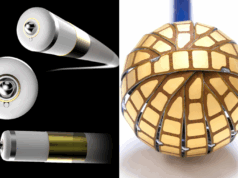
Medtronic has announced it has received CE mark for the Micra Transcatheter Pacing System (TPS). The device is less than one-tenth the size of traditional pacemakers and is delivered with minimally invasive techniques through a catheter, and implanted directly into the heart.
Comparable in size to a large vitamin, the Micra TPS does not require the use of leads, to deliver pacing therapy; rather, it is attached to the heart via small tines and delivers electrical impulses that pace the heart through an electrode at the end of the device.
“Unlike traditional pacemakers, the Micra TPS does not require leads or a surgical ‘pocket’ under the skin, so potential sources of complications are eliminated-as are any visible signs of the device,” says Philippe Ritter, cardiologist at Hôpital Cardiologique de Haut Lévêque and Centre Hospitalier Universitaire (CHU) Bordeaux, France. “While the Micra TPS is dramatically smaller, it is a fully self-contained pacemaker that still delivers the most advanced pacing technology available to patients.”
Once positioned, the Micra TPS is attached to the heart wall and can be repositioned or retrieved, if needed. The device responds to patients’ activity levels by automatically adjusting therapy. Despite its miniaturised size, the Micra TPS has an estimated 10-year battery life and is approved for full body MRI scans, providing patients with access to the most advanced imaging diagnostic procedures.
The device was awarded CE mark based on results from the first 60 patients (at three months) in the Medtronic Micra TPS Global Clinical Trial. The trial is ongoing and will continue to evaluate the safety and efficacy of the device through a single-arm, multicentre study that will enrol up to 780 patients at approximately 50 centres in 20 countries. Initial results from the Micra TPS Global Clinical Trial will be revealed for the first time at a late-breaking clinical trials session at the Heart Rhythm Society’s 2015 Annual Scientific Sessions in May.
In the USA, the Micra TPS is an investigational device and not yet approved for commercial use.
“Our cross-functional teams have been working for years to redefine engineering limits and production capabilities by radically reducing the size of medical devices by more than 90% while continuing to innovate upon the existing technology,” says Brian Urke, vice president and general manager of the Cardiac Rhythm and Heart Failure’s Brady business, which is part of the Cardiac and Vascular Group at Medtronic. “We believe our investment in this research is transforming cardiac care and will provide more and better therapy options to patients.”
The Micra device is available for patients who benefit from single-chamber pacing as it paces the right ventricle.









